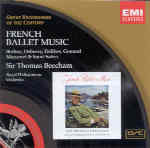Thomas Beecham’s mastery of this music is never in doubt, though I can’t help but feel that in some respects the exalted reputation this fluffy collection of French gems enjoys stems in part from sheer critical inertia. Take for example the Saint-Saëns Bacchanale: there’s energy aplenty, partly the result of unnaturally prominent castanets, but there also are some moments of slack ensemble and the Royal Philharmonic is no match for Ormandy’s Philadelphia players (on Sony Essential Classics), nor is EMI’s bass-shy stereo sound anything to brag about, however clearly it registers on this latest remastering.
Still, you won’t find better accounts of the Delibes ballet music from Le Roi s’amuse, a more charming Valse from Massenet’s Cendrillon, or more characterful dances from Gounod’s Faust (these last two in decent mono). Beecham’s Afternoon of a Faun is very good but not really exceptional, while the Berlioz excerpts similarly reveal efficiency rather than inspiration. But what can you really expect in a program of “bits and pieces”? Taken as a whole, this is indeed a charmer, and for most listeners that’s probably recommendation enough.
































